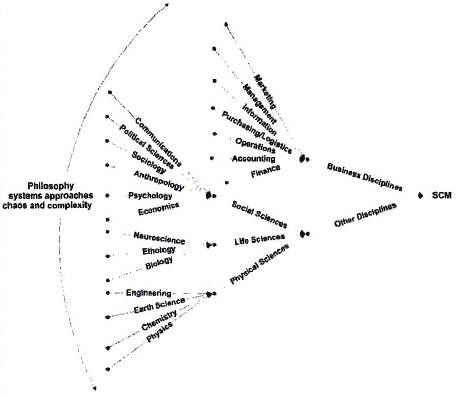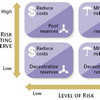 Supply Chain Management needs a new way to pursue research, a new way that is focused on theory building based on learned borrowing from other disciplines. That is how academians can breathe new life into the study of supply chain management. So say Michael E. Smith and Lee Buddress in their 2005 article, Supply chain management: borrowing our way to a discipline. But what do they actually mean? And why does supply chain management need a wider horizon in the first place?
Supply Chain Management needs a new way to pursue research, a new way that is focused on theory building based on learned borrowing from other disciplines. That is how academians can breathe new life into the study of supply chain management. So say Michael E. Smith and Lee Buddress in their 2005 article, Supply chain management: borrowing our way to a discipline. But what do they actually mean? And why does supply chain management need a wider horizon in the first place?
Disciplines don’t just happen, they are made
With the advent of today’s globalized and interconnected 24/7 business, and with supply chains stretched around the globe, endlessly pumping raw materials, finished goods, information and money from one end of the world to the other, supply chain management has emerged as an important discipline in business-related curricula. In the past, emerging disciplines have appeared when there were significant shifts in paradigm, enabling new perspectives to take the center stage. Such are paradigm shift is now needed in supply chain management.
Borrowing is a good thing
When I first saw the title tagline ‘Borrowing our way to a new discipline’, I thought the authors were ridiculing supply chain management for not having own thoughts, but stealing from other disciplines, and creating a separate discipline by simply pouring old wine in new bottles. But that is not what the authors mean. Although supply chain management may seem to lack a clear foundation in the Kuhnian sense, where for supply chain management to clearly exhibit disciplinary thinking, research should be
firmly based upon past scientific achievements, achievements that some particular scientific community acknowledges for some time as supplying the foundation for its further practice
that does mean that supply chain management is not an emerging discipline. Quite contrary, it clearly exhibits the hallmarks of an emerging discipline. But, in order to evolve further, and to root itself, supply chain management can and should embrace other fields, and not just the obviously related subjects.
Not a sum of smaller parts
Supply chain management uses a systems approach in much of its thinking, and as such, departs from the hard scientific disciplines, where the focus is no longer an analytical concentration on the parts, but a wider perspective on the whole:
A view of the supply chain from this perspective recognises that that we are not looking at a chain of entities but a web of relationships, and this view focuses not on optimising small portions of the web and assuming that the sum of optimised parts will represent the optimal whole. Instead, this perspective focuses on patterns that connect processes by which the web accomplishes the creation of value.
The creation of value seems to be a driving force in this article, but indeed, it is a driving force in supply chains.
Supply Chain Management is a verb, not a noun
So, supply chain management should be looking at expansive ways in which a greater interorganizational whole can be created and facilitated to creat enhanced customer value. This can only be done by adopting a liberal view of what comprises the new discipline:
This suggests moving away from viewing supply chain management as a ‘thing’, which serves immediately to restrict attention to those elements that have been defined into the term. Instead, we propose that supply chain management should be viewed as a verb. We can take this perspective if we view supply chain management as the orchestration of boundary-spanning intra-and interorganisational relationships withe the intention of enhancing the creation of value.
Strong and bold words.
Sources of knowledge in SCM
I think this figure needs no further explanation.

Creative approaches
Thus, what supply chain management needs, are new approaches and approaches adapted from other disciplines, and Smith and Buddress list some 25 examples of other disciplines and realms with obvious and not so obvious linkages to supply chain flows, some of which are:
- Finance – Option theory
- What are the strategies for quantifying an mitigating supply chain risk?
- Communications – Language
- How does languaging and categorization affect supply chain management effectiveness?
- Psychology – Change in social systems
- How does one promote movement toward and improved supply chain management?
- Biology – Epidemiology
- How do problems and innovation spread in supply networks?
- Physics – Chaos theory
- What are the limits of knowledge in supply chain management?
- Physics – Fluid mechanics
- How do changes in volume of materials affect the challenges of managing those flows?
These are only some of the more interesting sources of knowledge from other disciplines and how they might be applied to supply chain management. This list is indeed wider, more expansive, and more creative than the list presented by James Stock in Applying theories from other disciplines to logistics.
Conclusion
This paper does show a new way to pursue research in supply chain management. Instead of cataloguing best practices and fact finding (there are an array of case studies in supply chain management research), the focus should be on learned borrowing from other disciplines. It is only this way that it is possible to present thought-provoking paradigms and methods that can be found useful in supply chain management. The limit is the imagination of the researcher.
Giordano Bruno
Speaking of imagination, and being some sort of crossbreed-researcher myself, I am again reminded of Giordano Bruno, which I mentioned in my previous post on Broader research = better research:
Giordano Bruno was a philosopher who took the current ideas of his time and extrapolated them to new and original vistas. He claimed that all matter was intimately linked to all other matter, that we live in a universe in which all things are related. Nothing could be more true of the global supply chains of our days. Giordano Bruno is unique compared to the other martyrs of his time because of the power of his forward-thinking, where others were personal-thinking or contrary-thinking.
It is indeed time for supply chain management to be forward-thinking, and take in other perspectives, and today, 4 years after Supply chain management: borrowing our way to a discipline, I can tell that many new ideas are already in the mold.
Reference
Smith, M., & Buddress, L. (2005). Supply chain management: borrowing our way to a discipline International Journal of Services and Operations Management, 1 (4) DOI: 10.1504/IJSOM.2005.007495
Links
- linkedin.com: Michael E Smith
- researchgate.net: Michael E Smith
- linkedin.com: Leland Buddress
Related
- husdal.com: Broader research = better research?
- husdal.com: What kind of supplychainist are you?












